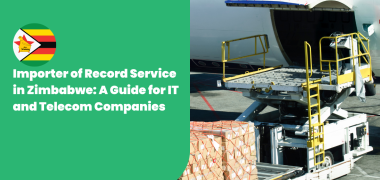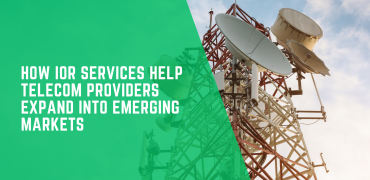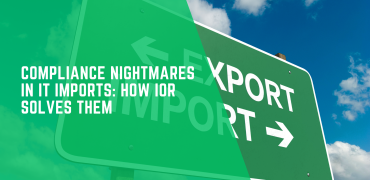Importing IT and telecom equipment into Zimbabwe involves navigating a complex regulatory environment. For IT and telecom companies, understanding these processes is critical to ensure compliance and minimize costs. One effective solution to manage this complexity is using an Importer of Record (IOR) service. This blog post provides an in-depth guide on the Importer of Record service in Zimbabwe, focusing on its benefits and outlining the various duties and taxes applicable to importing IT and telecom equipment.
1. Understanding the Importer of Record (IOR) Service
An Importer of Record (IOR) service simplifies the process of importing goods into a foreign country by acting as the responsible entity for ensuring compliance with local laws and regulations. The IOR assumes responsibility for:
- Handling all customs documentation.
- Paying the necessary duties and taxes.
- Ensuring compliance with local regulations and standards.
- Managing logistics and warehousing, if necessary.
By acting as the official importer, the IOR takes on the legal obligations associated with importing goods, allowing businesses to focus on their core operations.
2. The Importance of IOR for IT & Telecom Companies
IT and telecom companies often deal with high-value and technically complex equipment that requires careful handling and adherence to specific import regulations. The challenges faced by these companies when importing equipment include:
- Complex Regulatory Requirements: Different countries have unique regulations concerning the import of electronic equipment, including technical standards and environmental compliance.
- Customs Documentation: Preparing and submitting accurate customs documentation is crucial to avoid delays and fines.
- Tax Compliance: Understanding the applicable duties and taxes is essential for cost planning and compliance.
- Logistics Coordination: Efficient logistics management ensures timely delivery and minimizes the risk of damage during transit.
By using an IOR service, IT and telecom companies can effectively manage these challenges, ensuring that their equipment is imported smoothly and efficiently.
3. Overview of Import Regulations in Zimbabwe
Zimbabwe’s import regulations are governed by several government bodies, including the Zimbabwe Revenue Authority (ZIMRA) and the Ministry of Industry and Commerce. Key regulatory requirements include:
- Import Licenses: Certain goods may require an import license issued by the Ministry of Industry and Commerce. It’s crucial to verify whether the equipment being imported requires such a license.
- Technical Standards: IT and telecom equipment must comply with local technical standards and regulations. This may include obtaining certifications or approvals from relevant authorities.
- Environmental Compliance: Zimbabwe enforces regulations concerning electronic waste and the environmental impact of imported equipment. Compliance with these regulations is necessary to avoid penalties.
4. Duties and Taxes on IT & Telecom Equipment in Zimbabwe
When importing IT and telecom equipment into Zimbabwe, several duties and taxes may apply. Understanding these costs is essential for accurate budgeting and cost management. Below are the primary duties and taxes applicable:
- Customs Duty: The customs duty rate varies depending on the type of equipment being imported. Generally, IT and telecom equipment attract lower duty rates to promote technological advancement.
- Value Added Tax (VAT): VAT is levied at a standard rate of 14.5% on the value of the imported goods, including the cost of goods, insurance, and freight (CIF).
- Surtax: A surtax of 10% may apply to certain luxury goods, although IT and telecom equipment are typically exempt from this tax.
- Excise Duty: Excise duty is generally applicable to specific categories of goods, such as alcoholic beverages and tobacco, and does not typically apply to IT and telecom equipment.
- Other Fees: Additional fees may apply, such as inspection fees, handling fees, and processing fees. These can vary based on the specific circumstances of the import.
Example Duty Rates
- Laptops and Computers: Typically subject to 5% customs duty.
- Mobile Phones: Generally attract a 25% customs duty.
- Networking Equipment: May be subject to a 15% customs duty.
It’s important to consult with a customs expert or an IOR service provider to get precise duty rates for specific products, as these can change based on government policy.
5. Benefits of Using IOR Services in Zimbabwe
Using an Importer of Record service offers several advantages for IT and telecom companies:
- Regulatory Compliance: IOR service providers have expert knowledge of local regulations, ensuring compliance and reducing the risk of penalties.
- Cost Management: Accurate calculation and payment of duties and taxes help avoid unexpected costs.
- Time Efficiency: By handling all import-related processes, IOR services save companies time, allowing them to focus on business operations.
- Risk Mitigation: IOR services mitigate risks associated with importation, including legal and logistical challenges.
- Logistics Support: Many IOR service providers offer end-to-end logistics support, ensuring safe and timely delivery of equipment.
6. Choosing the Right IOR Service Provider
Selecting the right IOR service provider is crucial to successfully import IT and telecom equipment into Zimbabwe. Here are some factors to consider:
- Experience and Expertise: Choose a provider with a proven track record and expertise in handling IT and telecom equipment.
- Local Knowledge: A provider with in-depth knowledge of Zimbabwe’s import regulations and procedures will ensure smoother operations.
- Comprehensive Services: Look for a provider offering a full range of services, including customs clearance, logistics support, and compliance management.
- Transparent Pricing: Ensure the provider offers transparent pricing with a clear breakdown of costs and fees.
- Reputation and References: Research the provider’s reputation and seek references from other businesses that have used their services.
7. Conclusion
Importing IT and telecom equipment into Zimbabwe requires navigating a complex regulatory landscape, understanding various duties and taxes, and managing logistics. Using an Importer of Record service can streamline this process, ensuring compliance and efficiency.
By partnering with the right IOR service provider, IT and telecom companies can focus on their core operations, confident that their import activities are being handled professionally and in compliance with Zimbabwean regulations. This strategic approach not only reduces costs and risks but also facilitates the growth and expansion of businesses within the Zimbabwean market.
Understanding and leveraging IOR services can make a significant difference in the success of IT and telecom companies operating in Zimbabwe. With the right support, these companies can successfully navigate the import process, ensuring that their technology and equipment reach their destinations smoothly and efficiently.




